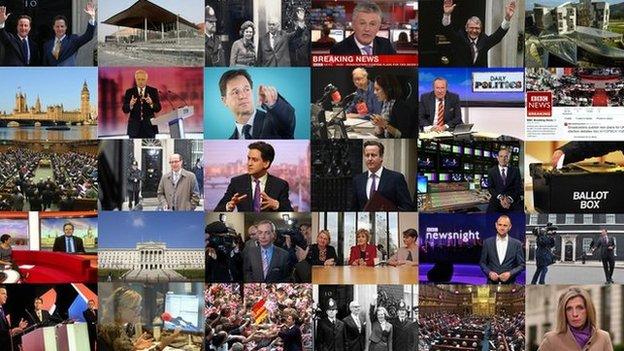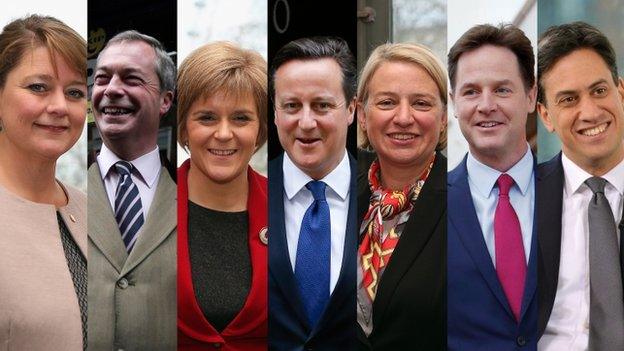Election 2015: Me... and why it's all about you
- Published

1) Nick's news: Do not adjust your set
Today I'm taking a baby step towards returning to work and covering the election, starting with a little light blogging.
The operation to remove a carcinoid tumour from my lung was a complete success. I am now beginning a course of chemotherapy to try to stop the cancer even daring to think of returning. I'm also working to restore the strength of my voice after the op.
Many thanks to all the doctors and nurses who have been, and are, looking after me - particularly at the Royal Brompton and Royal Free hospitals. Heartfelt thanks too to the many people who have been in touch with their good wishes.
Normal service will be resumed as soon as possible.
That, though, is enough about me. The next few weeks are all about you and who you choose to vote for ...or don't. Talking of which, that's the subject of my first proper blog.
2) Election 2015 - It's all about you

The seven participants in this week's TV debate
It's all about you. Not them. You.
That's worth remembering if/when you tire of all those politicians, soundbites and photo opportunities that will fill the airwaves - and your inbox - from the formal start of the campaign today, until polling day.
About you because a general election is one of those rare times when your voice counts as much as anyone else's.
About you because you have the chance to help choose who represents you and your community in Parliament.
About you because you can influence who will run the country for the next five years and, therefore, help shape what sort of country you live in.
Rarely has there been a choice so wide or one with an impact which could be so dramatic.
For most of my adult life, elections have been reduced to a choice of Red or Blue, Labour or Tory, Mr A versus Mr or Mrs B for Prime Minister. Not any more.
With the polls so close, with the inexorable decline of the big two parties, with the widespread hunger for a different type of politics the range of election outcomes is bewildering.
They go way beyond single party governments led by David Cameron or Ed Miliband or another coalition with Nick Clegg.
Watch the parade of party leaders who will take to the stage for this week's TV debate and you'll get a flavour of what might be to come.
Unless you're paid to follow these things, or are an amateur political train spotter, you might struggle to put a name to every one of the seven faces - try naming the leader of Plaid Cymru if you're not living in Wales.
Yet Leanne Wood - that's her name, Nicola Sturgeon - of the SNP, Natalie Bennett of the Greens and UKIP's Nigel Farage might help to shape the make-up and the policies of our next government. Not to mention the man who isn't taking part - Peter Robinson, the leader of Northern Ireland's DUP.
Any of them might find themselves haggling day by day, vote by vote, issue by issue with the next government, if the result is as close as the polls currently suggest it will be.
Aha, I hear you say, but what on earth has any of this got to do with me? Consider the following questions and you'll have your answer.
Do you care whether Britain stays in or gets out of the EU?
Do you mind if the UK breaks up, with Scotland becoming an independent nation?
Do you have a view about whether we send British forces abroad to fight? Or spend billions renewing our nuclear deterrent?
Have spending cuts gone too far or are more needed to balance the nation's books? Do you think welfare's too generous or that benefit cuts are hurting the vulnerable?
Do you think the country is full or do you fear that politicians might stop the immigration the country needs?
The make-up of the next government will make a profound difference to the answer it gives to these questions.
Whatever your view on them, there's probably someone running for election where you live, with views close to your own.
If you live in a seat where the outcome's in doubt, you could make the difference between who wins and loses. Even if you live somewhere where the same party always wins, your vote could send a signal about the national mood.
Finally, take another look at David Cameron and Ed Miliband.
Ask yourself whose values are closer to your own, who you'd prefer to see representing your country abroad and who you think has the skills needed to lead.
To many, David Cameron and Ed Miliband seem very similar - middle-aged white men from well-off families in the south of England who have spent most of their adult lives as professional politicians.
On the other hand, they have profoundly different values and profoundly different ideas about what being prime minister involves.
Cameron sees himself as a man capable of taking decisions, who is not weighed down by ideology. His critics say that, all too often, that means that he takes decisions that suit the sort of people he grew up with, and he has no real idea where he's taking the country.
Miliband, on the other hand, privately sees himself as a man with a mission to bring about lasting change in his country and to re-write the rules. Another Clement Attlee or Margaret Thatcher in other words. His critics argue that he too is the prisoner of the views he grew up with, and that he does not have the leadership skills needed to run the country.
Now, if having read all of this you think none of this really matters to me, or if you prefer to agree with your friends that all politicians are the same or nothing ever changes or they're all in it for themselves then you would be right to insist this election is not really all about you at all.
That, though, will be your choice and no-one else's.